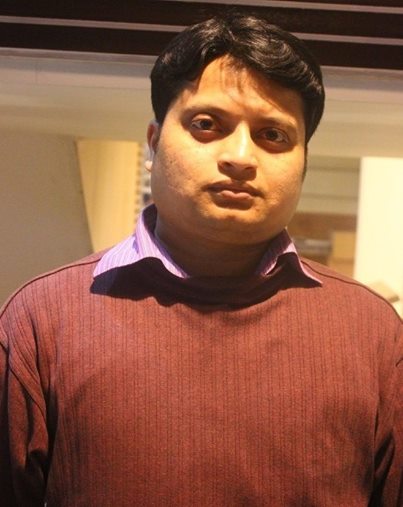Rationalists’ and Humanists’ Forum of India condemns the act. The general secretary of RHFI, Debashis said that “The rationalists and free thinker bloggers of Bangladesh are in a state of panic right now. Some of them have stopped writing and some are hiding themselves. This is the ninth such murder since 2013. The government is supporting the fundamentalists.”
Ananta Bijoy Das, a Bangladeshi writer known for advocating science and secularism, was hacked to death by masked men wielding machetes while on his way to work Tuesday morning.
Das died instantly in the attack, police in Sylhet city told the Associated Press. He is the third Bangladeshi writer to be killed in less than four months.
Though police did not offer a motive for the killing, they mentioned to Al Jazeera that Das has written about science and the evolution of the Soviet Union. He was also a blogger for Mukto-Mona, or “free mind,” the site launched by prominent author Avijit Roy, who was killed at a Bangladeshi book fair in similar fashion in February.
“Mukto-Mona … is about free thinking and is about explicitly taking on religious fundamentalism and particularly Islamic religious fundamentalism. [Das and Roy’s] names have been on lists of identified targets,” Sara Hossain, a lawyer and human rights activist in Dhaka, Bangladesh, told the BBC.
Attacks on progressive writers and critics of Islam are happening with increasing regularity in Bangladesh, where nearly 90 percent of citizens are Muslim and religious conservatism is a rising response to political turmoil. The country has a long tradition of official secularism — the principle was enshrined in the 1971 constitution (though that section was nullified between 1979 and 2010). But in periods of conflict, it also has a tradition of antagonism toward religion’s most radical critics.
Washiqur Rahman, a young blogger who was hacked to death in March, lamented online before he was killed:
Today is Bangladesh’s liberation day
The Mullah has freedom, extremists have freedom, Muslims have freedom, the corrupt have freedom, political leaders have freedom, adulates of the political leaders have freedom, rapists are free, the armed forces are free, so-called civil society is free, intellectuals who support Islamists, they also have freedom, religious leaders have freedom, the garment factory owners have freedom, the ferry owners have freedom.
Not free: the farmers and labours
Not free: indigenous people and minorities
Not free: Freethinkers
Not free: All the people who just want to be human…
“His writing was very good. He was … careful, but that did not save him,” Arifur Rahman, another Bangladeshi atheist blogger and an acquaintance of Rahman’s, told the International Humanist and Ethical Union (IHEU), which translated Rahman’s post.
Two men were arrested in connection with Washiqur Rahman’s death. Meanwhile, police are investigating whether the local extremist group thought to be behind Roy’s death is connected with al-Qaeda. A video from Asim Umar, the purported leader of al-Qaeda in the Indian Subcontinent, surfaced last week claiming responsibility for Roy’s and other killings.
“These assassinations are part of a series of operations initiated on the orders of our respected leader,” Umar reportedly said in the video, the Post’s Annie Gowen reported.

Bangladeshi social activists shout slogans during a protest against the killing of Avijit Roy. (Munir uz Zaman/AFP/Getty Images)
These three are the latest of several secularists to be killed or injured in attacks in recent years. Tensions between the Bangladeshi government and the Islamist opposition have put progressive writers in a precarious position, according to the Committee to Protect Journalists. As the Post’s World-Views pointed out in February, religious conservatives and secularists alike have been denied political power. But in a country with a culture of zero-sum politics and a history of religious conflict, marginalized Islamist are as likely to lash out at bloggers as they are at Bangladesh’s prime minister.
“Mr. Roy and Mr. Rahman were the victims of murderous thugs, but they were also the victims of a poisonous political climate, in which secularists and Islamists, observant Muslims and atheists … are pitted against one another,” Tahmima Anam, a Bangladeshi writer and anthropologist, said in a New York Times op-ed after Roy and Rahman were killed. She titled the piece “Save Bangladesh’s bloggers.”
Last year, the group Ansar al Islam Bangladesh (also called Ansarullah Bangla Team) posted a “hit list” of writers seen as opponents of Islam, the advocacy group Reporters Without Borders reported. Among the killings for which the group claimed responsibility was the 2013 attack on Rajib Haider, an activist who called for harsh punishments of Islamists who committed atrocities during the country’s 1971 war. The same group is thought to be behind the attack on Roy.
Among Bangladeshi liberals, there’s little confidence that attacks on secular writers will be punished.
“The culture of impunity that has spread over the last few years clearly has very damning results,” Arifur Rahman told IHEU after Washiqur Rahman was killed. “… The word ‘Nastik’ (atheist) has been vilified in Bangladesh (and the rest of the Muslim world); they are seen as sub-human, it is OK to kill them.”
“It’s one after another after another,” said Imran Sarker, who runs the Blogger and Online Activists Network in Bangladesh, told CNN Tuesday. “It’s the same scenario again and again. It’s very troubling.”
In addition to writing for Mukto-Mona, where he won a “Rationalist Award” in 2006, Das edited a local science magazine, according to CNN. Fellow bloggers said that Das sometimes wrote against religious fundamentalism but most often focused on championing science.
“He was a voice of social resistance; he was an activist,” Sarker said. “And now, he too has been silenced.”
By: Sarah Kaplan
Morning Mix
